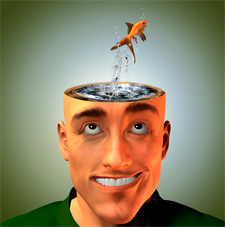
Sigh-cotherapy
Dr. Zev Ballen candidly reveals the pitfalls, myths and futility of secular psychotherapy, and offers a bold, fresh and highly successful alternative...

Here’s the question that’s gnawed at me for most of my life.
What, if anything, would make me happy?
I became a psychotherapist in the hope of finding the answer to this question.
As part of my training I was required to undergo a full classical Freudian psychoanalysis. I lied on the couch 4 times a week and free associated to an analyst who I never saw. She sat behind me for almost nine years. During that time, if I wanted to make emotional contact with her, I wasn’t allowed to turn around. Through her abstention from being a person, my analyst became a blank screen. At times, my unconscious fantasies turned my analyst into a withholding childhood mother, a punitive father, or even an omnipotent G-d-like figure. As my childhood conflicts emerged, I gained incredible insights into myself and my dealings with people. Unfortunately, despite a plethora of insight, after nine years I can’t say that I was any happier than when I began.
Then I started banging on pillows with baseball bats and tennis rackets in an effort to release my pent up  aggression and hurt feelings. The primal scream therapist prompted me to scream at the top of my lungs. This procedure helped me to feel like a new person for about two days.
aggression and hurt feelings. The primal scream therapist prompted me to scream at the top of my lungs. This procedure helped me to feel like a new person for about two days.
In cognitive behavioral therapy I focused on trying to make all of my thoughts positive. “I’m a happy person..I’m a happy person…I’m a happy person!” The problem with that was that I was forcing myself to be positive but my internal state had not changed. I soon saw that I could not just by-pass my internal mood I needed to deal with it.
Next I became fascinated with hypnosis. I was sure that with the aid of hypnosis I would be able to go deeper into my mind and uproot the mess in my unconscious mind. The problem with positive thinking had been that it did not deal with the skeletons that were hiding deeper down in my unconscious closet. So I hoped that by re-programming my unconscious mind with positive hypnotic suggestions that this would make me happy.
Unfortunately it turned out that even my unconscious mind had a mind of its own. My unconscious mind stubbornly refused to accept even pleasant hypnotic suggestions for more than a few days – after that my body seemed to reject them as if they were foreign bodies.
It was around this time that I discovered the fascinating world of Ericksonian hypnosis. My Ericksonian hypnotherapist said that traditional hypnosis had not helped me because my unconscious was not some passive entity that could be bombarded by ideas however positive – he said that my unconscious demanded more respect than this. I was told that my unconscious mind had amazing untapped resources that could be used to find creative solutions to my problems. This sounded great. I couldn’t wait to start. It was truly empowering to be told that I was smarter and more resourceful than I knew I was in my unconscious mind. This was by far the most compelling psychological theory yet. If I could learn to trust my unconscious then everything would be okay.
The problem was that although I could now access more of my unconscious creativity, still my unconscious didn’t always know what to do when I was in severe conflict. Whenever the stress mounted I gravitated back to my core conflicts.
So I decided to give psychoanalysis another try but this time the interpersonal school of psychoanalysis. Instead of the emphasis on picking apart the inner workings of my mind I would now hopefully be cured through the corrective emotional experience of a “therapeutic relationship.” The idea was that I had never had a healthy relationship before and having one with someone who had earned a degree in psychology would be my ticket to personal growth and salvation.
It wasn’t.
Determined to cure my neurosis I tried a family therapist. He sat with me on the couch and together we drew my family genogram – a pictorial view of my family tree. He showed me how I am reliving the life of one of my ancestors who lived three generations ago. The theory is that there was some “unfinished business” in that person’s life that I am trying to complete in a maladjusted way. All of these therapies were really interesting intellectually. But no – family therapy didn’t do it for me either.
Then came gestalt therapy. I was put in a chair and was “helped’ to resolve my relationship with mom by speaking to her in empty chair across front of me.
Need I say more?
In primal scream therapy I was taken into a sound proof room and told to scream at the top of my lungs. All that I got from this was a sore throat.
In paradoxical psychotherapy I was told that all of my worries and concerns about myself were absolutely true (a form of reverse psychology). I was in fact a depressed narcissist with competitive and emotionally dependent traits.
The theory behind paradoxical therapy was that my problems were rooted in repressed rage. The therapist continued to provoked me in the hope that I would break through my inhibitions and lash out at him.
I couldn’t really take the paradoxical approach seriously. It was easy to see through the therapist’s ploys – especially since I had read about this technique in graduate school.
After all this, I expressed my misgivings about traditional therapy to a clinical supervisor telling her that I was feeling drawn towards spirituality. My supervisor told me that if I abandoned psychotherapy for spirituality, I would be acting out my wish to claim an oedipal victory. I was looking for a vindictive triumph over my mom who was a psychoanalyst.
That was the last straw.
I am writing this in the hope that I can save you the enormous outlay of time, money and emotional turmoil that almost 40 years of aimless wandering through the wasteland of secular psychotherapies has cost me.
Here are 16 reasons not to go to for secular therapy:
* Any form of psychological treatment that is not based on emuna will at best, lead to temporary and incomplete results.
* Psychology can never be separated from morality. It is only through the study of Jewish Law that we can determine what is good and what is not.
* Restlessness, irritability, impatience, anxiety, low-mood, obsessive thinking, impulsive behavior, aggression, competitiveness and sadness– are all reduced or eliminated when one lives in alignment with the Spiritual Truths than run the universe.
* Becoming conscious of one’s unconscious will not lead to psychic liberation.
* There is no such thing as a neutral and unbiased therapist. His morality is still speaking to your unconscious mind.
* The curative value of a “therapeutically corrective relationship” with the therapist is a myth.
* Ventilating and catharsis of rage only serves to reinforce and strengthen it.
* “Therapeutic regression” to the scene of a trauma can be more dangerous than helpful.
* A therapist’s abstinence and lack of gratification to his client is not helpful.
* Most psychotherapists have had very dysfunctional childhoods.
* Most psychotherapists have not had psychotherapy on themselves.
* The theoretical underpinnings of psychotherapy are mostly heretical and come from unclean sources.
* A person cannot have mental health without being part of a community.
* Conventional psychotherapy encourages dependency.
* Psychotherapy only makes addictions worse.
* Many people go into debt because of the expense of psychotherapy.
A vibrant relationship with G-d is the underpinning for Emuna Therapy. That’s the difference – and that’s why it works when all other secular approaches and disciplines have failed.











10/07/2015
Inspiring Story
We all need to find our way. I have many things in common with you. I have searched too. Laughter Therapy and Laughter Yoga helps with Emuna like nothing else.
10/07/2015
We all need to find our way. I have many things in common with you. I have searched too. Laughter Therapy and Laughter Yoga helps with Emuna like nothing else.